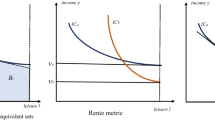Abstract
Income compensation functions based on preference relations that are not required to be transitive or complete are studied, and a nearly complete theory of compensated consumer behaviour is developed, using a weaker version of representability.
Similar content being viewed by others
References
W.E. Diewert, Duality approaches in microeconomic theory, in:Handbook of Economics, Vol. 2, ed. K.J. Arrow and M.D. Intriligator (North-Holland, Amsterdam, 1982), pp. 535–599.
W. Fenchel, Convex cones, sets, and functions, Lecture Notes, Princeton University (1953).
J. Fountain, Consumer surplus when preferences are intransitive: Analysis and interpretation, Econometrica 49(1981)379–395.
S. Fuchs-Seliger, An application of Helly's theorem to preference-generated choice correspondences, Int. Econ. Rev. 25(1984)71–77.
S. Fuchs-Seliger, On the existence of choice correspondences, Meth. Oper. Res. 48(1985)216–226.
S. Fuchs-Seliger, An axiomatic approach to compensated demand, J. Econ. Theory (in press).
D. Gale and A. Mas-Collell, An equilibrium existence theorem for a general model without ordered preferences, J. Math. Econ. 2(1975)9–15.
S. Honkapohja, On the continuity of compensated demand, Int. Econ. Rev. 28(1987)545–557.
L. Hurwicz and H. Uzawa, On integrability of demand functions, in:Preferences, Utility and Demand, ed. Chipmand et al. (Harcourt Brace, New York, 1971), pp. 114–148.
W. Shafer, Equilibrium in economics without ordered preferences or free disposal, J. Math. Econ. 3(1976)135–137.
A. Mas-Colell, An equilibrium existence theorem without complete and transitive preferences, J. Math. Econ. 1(1974)227–246.
A. Mukherji, The existence of choice functions, Econometrica 45(1977)889–894.
H. Sonnenschein, Demand theory without transitive preferences, with applications to general equilibrium theory, in:Preferences, Utility and Demand, ed. Chipman et al. (Harcourt Brace, New York, 1971), pp. 215–223.
H.R. Varian, Non-parametric tests of consumer behaviour, Econometrica 50(1982)945–973.
J. Weymark, Money-metric utility functions, Int. Econ. Rev. 26(1985)219–232.
Author information
Authors and Affiliations
Rights and permissions
About this article
Cite this article
Fuchs-Seliger, S. Compensated and direct demand without transitive and complete preferences. Ann Oper Res 23, 299–310 (1990). https://doi.org/10.1007/BF02204854
Issue Date:
DOI: https://doi.org/10.1007/BF02204854




